When I wrote about my glimpses of the Ukrainian rock scene in the book The Humorless Ladies of Border Control, many of the musicians I spoke to had been newly radicalized by the 2014 “Revolution of Dignity” (or Maidan Revolution), and the Russian annexation of Crimea that followed. One was Sasha Boole, a rambunctious singer-songwriter from Chernivtsi, a city in southwestern Ukraine near the Romanian and Moldovan border. We played a show together in the provincial town of Kalush. “Everyone thinks he looks just like you,” the promoter told me. “We made up a myth that you were brothers, that you fell in love with a girl but she chose Sasha, and so you went to America.”
When Sasha arrived, I saw what they meant…He wore a handlebar moustache and a bowler hat and sported a tattoo of a skeleton playing a banjo. He had dark hair and light blue eyes, wore a sweater tied around his neck like a golf pro, and sang the kind of romanticized Americana that was increasingly popular in Eastern Europe: a bandolier of harmonicas, a stomp box, a version of “Down by the Riverside.”
Unusually, Sasha mixed the unionist/progressive leftism common to most folk-punk Woody Guthrie fetishists with a radical militancy. “I played in Kyiv, at the Maidan,” he says. “It was an honor. . . . [Maidan] was worth it not so much for the results but because it turned a tumbler in the minds of Ukrainians.” He mimed a key turning beside his temple. “That we have to work together. The people from the medical school coming out under fire to help the injured. Like the American Communists, like Upton Sinclair—there is a history in America of organizing and popular uprising that we don’t have.”
I commented on the irony of a former Communist state looking to American communism—which had, after all, been even less successful in practical terms than the Soviet version—as a future for Ukraine. He made a gesture of acknowledgment. But pacifist, Occupy-style activism was too weak to force change, he says. “People learned that the government only respects force. The first people in Maidan, they were doing art actions, flash mobs—the government came and beat them up. But the next time the government came, they were burning cars and setting fires, and the government says, ‘OK, we will negotiate!’”
Eight years later, the smoldering war in the east exploded into a full-scale Russian invasion. Boole is now working with internal displaced persons—Ukrainians from Kyiv, Kharkiv, and other regions more acutely affected. Thousands of them are in city-organized shelters in schools and sports arenas, some looking for long-term work and housing in the relatively safe region of Chernivtsi. Many wait for opportunities to cross the border: “I had a girl in my flat—she’s still living there—she’s from Kyiv, and her story is short: she left her home when the bombing started; just dropped a piece of chocolate in a backpack, her documents and some basic things. She thought that she was leaving just ten minutes to sit in a subway, but then she spent three days and three nights. After that, she was evacuated by train to Chernivtsi. These people need everything because they have nothing,” Boole told me.
Touring musicians, of course, have unusually extended networks of colleagues and acquaintances. Boole is calling on his: “One guy from a Polish band who’s been on tour with me—I wrote to him and says, ‘Dude. We need armor, please do something. I know you’re a tough guy. You are [re-enacting] the Vietnam War. So, you definitely know the guys who have armor.’ And he says, “Okay. I will try.” And in a couple of days. I got a message from him. “‘Man—sorted!’ And a photo of a room full of [helmets and bulletproof vests].”
Music scenes are almost by definition urban, and the Ukrainian music scene is centered around (but hardly exclusive to) Kyiv, Kharkiv, and Odessa—three of the cities hardest hit by a Russian attack that manages to seem both brutal and surprisingly enervated in the face of truculent, sardonic, and (not insignificantly) meme-ready Ukrainian resistance.
If the 2014 revolution centered on the Europhilia of the Ukrainian cultural class, the 2022 war has hardened their Russophobia. “Even the bands or artists that [had been] kind of shunned for being pro-Russian spoke up” against the invasion, says Lesyk Mahula of Lviv-based metal band Somali Yacht Club. “[Not] even during the Revolution of Dignity have I seen such unity in the country,” echoed Sasha Kladbische, from the Kyiv-based “Gothic Americana” band Zwyntar. “Even old people are standing in queues for registration in defense groups. Grandmothers bring bottles to make Molotov cocktails in case the enemy enters the city. Any Ukrainians who were neutral toward Russia are now full of terrible hate. The soil will burn under the feet of Russians. They will never find peace on our land.”
“You have a very hard mix of feelings,” says Artem Dudko of the psychedelic garage rock band Straytones, who is in Kyiv with his family. “It’s a mixture of anger, hatred; at the same time feeling very emotional, the uplifting uniting feel of the nation.”
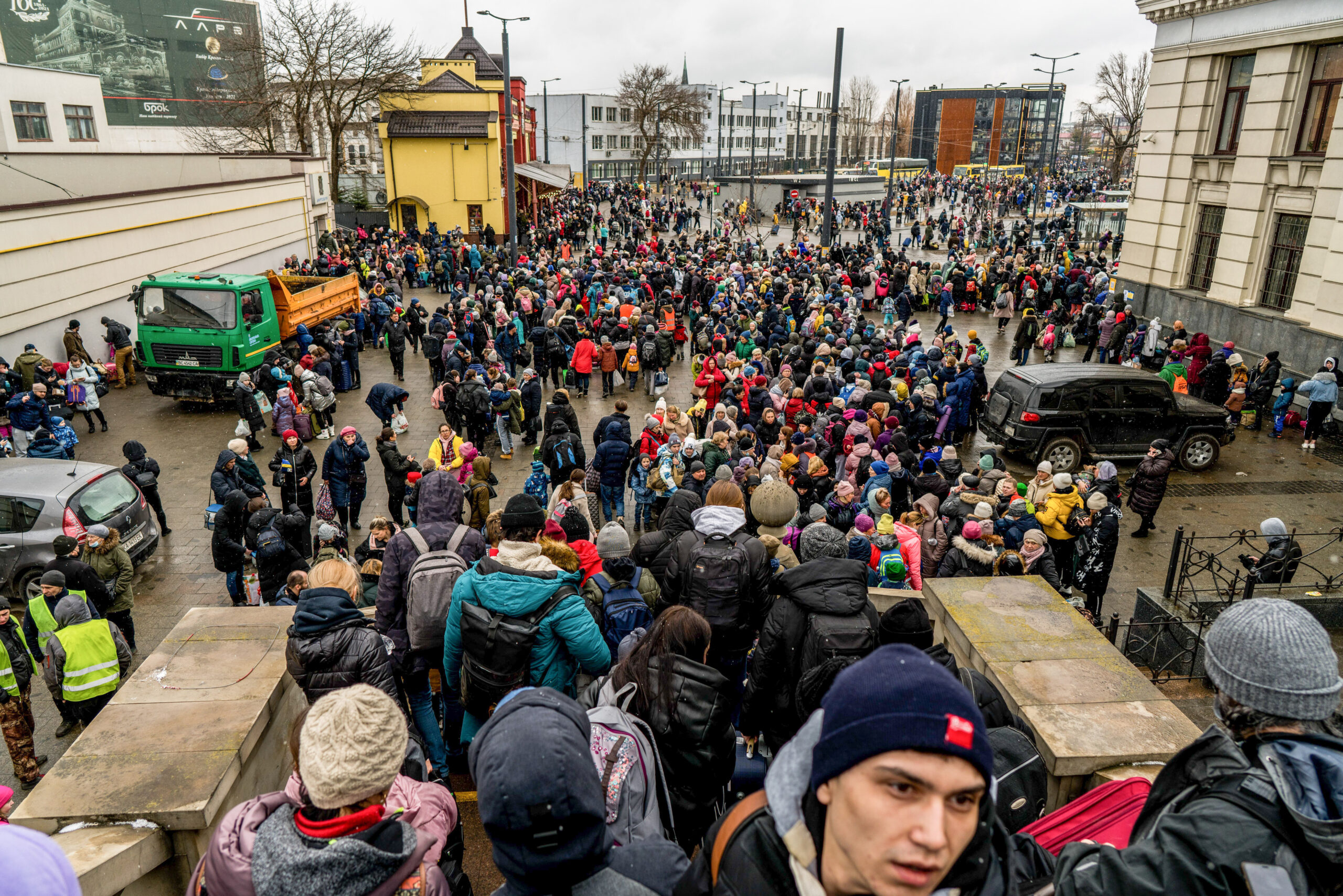
Music scenes are also, by necessity, laboratories for collaboration and mutual aid. “There’s been a lot of humanitarian help already,” says drummer Lusya Zoria, who is volunteering despite being an internal displaced person herself (with her family). “Yesterday we spent time at one of the volunteer centers sifting through supplies that come from over the border, from Romania, from Moldova, from all over really. The issue is how to get it to the cities that need it the most—to Kyiv, to Kherson, to Kharkhiv, to towns that have been completely cut off and there is no getting through to them. There are no humanitarian corridors.” (The humanitarian corridors currently proposed by Russia lead to Russian- and Belarussian-controlled territory.)
Music scenes are not often incubators for open patriotism and militarism, but these dire circumstances changed that. Even high-profile musicians like Boombox singer Andriy Khlyvnyuk—”real celebrities,” says Boole admiringly—joined early and publicly. Musicians from all backgrounds have joined military and paramilitary groups at various levels. “Our army, God bless them,” said Dudko. “ACAB is abolished during the war,” says Death Pill drummer Anastasia Khomenko, who is sheltering in Kyiv with her husband, son, two cats, and a friend, sleeping in the bathtub for safety. “Police are sharing Molotov cocktail recipes via their official channels of communication, and preparing this traditional beverage together with civilians,” Lviv promoter Lyana Mytsko told me.
Vovk bassist and singer Oleksandr Kuts pointed out the importance of the “cyber-army” (highlighting Ukrainians’ sometimes infamous hacking skills.) Somali Yacht Club’s Mahula says he and his bandmates, in addition to their other activities in Lviv, are also “‘fighting’ on the cyber front.”
“If [Russians] don’t care that people are dying in Ukraine, maybe they will care that they can’t go watch fucking Nick Cave.” —Lesyk Mahula, Somali Yacht Club
Those who missed or didn’t have the chance to join an official military order (the National Guard, the police, or the Ukrainian Armed Forces), are joining territorial defense units. These ad hoc militias provide essential services. “They fight and patrol the streets that are full of Russian saboteurs,” says Konstiantyn Onopriienko of the hardcore band Clearsight. “These saboteurs are very dangerous because they often work as fire spotters to Russian artillery. So, the territorial defense units are extremely effective. [They’re] even equipped with NLAWS or Javelins. They’re able to stop tanks.
Enthusiasm for the military is high enough that military leaders have had to turn people away, says Dudko: “So those who really want to fight, they are either already on the front or in training camps.”
“I know a few guys from the hardcore punk scene who took up arms; graffiti artists who not only destroy Russian targeting stickers but took up arms themselves,” Onopriienko says. “I don’t have any exact numbers of how many, because, you know, people aren’t very talkative right now.” These volunteer militias—among other roles—patrol the streets of residential areas during curfew. “They’re like the vigilante men,” says Dudko. “They are looking, and checking documents, and if it’s understood that this is not a guy from the neighborhood, then he’s gonna die.”
“Right now,” adds Kyrylo Brener of the Kharkiv-based band Kat, “and I know this is 100% true—if I go to the territorial defense, they will not allow me to join, because I don’t have any experience with combat. And right now, they want only people with experience. I would be useless. They don’t even have the equipment, because so many people want to join. There are basically lines to join the territorial defense.”
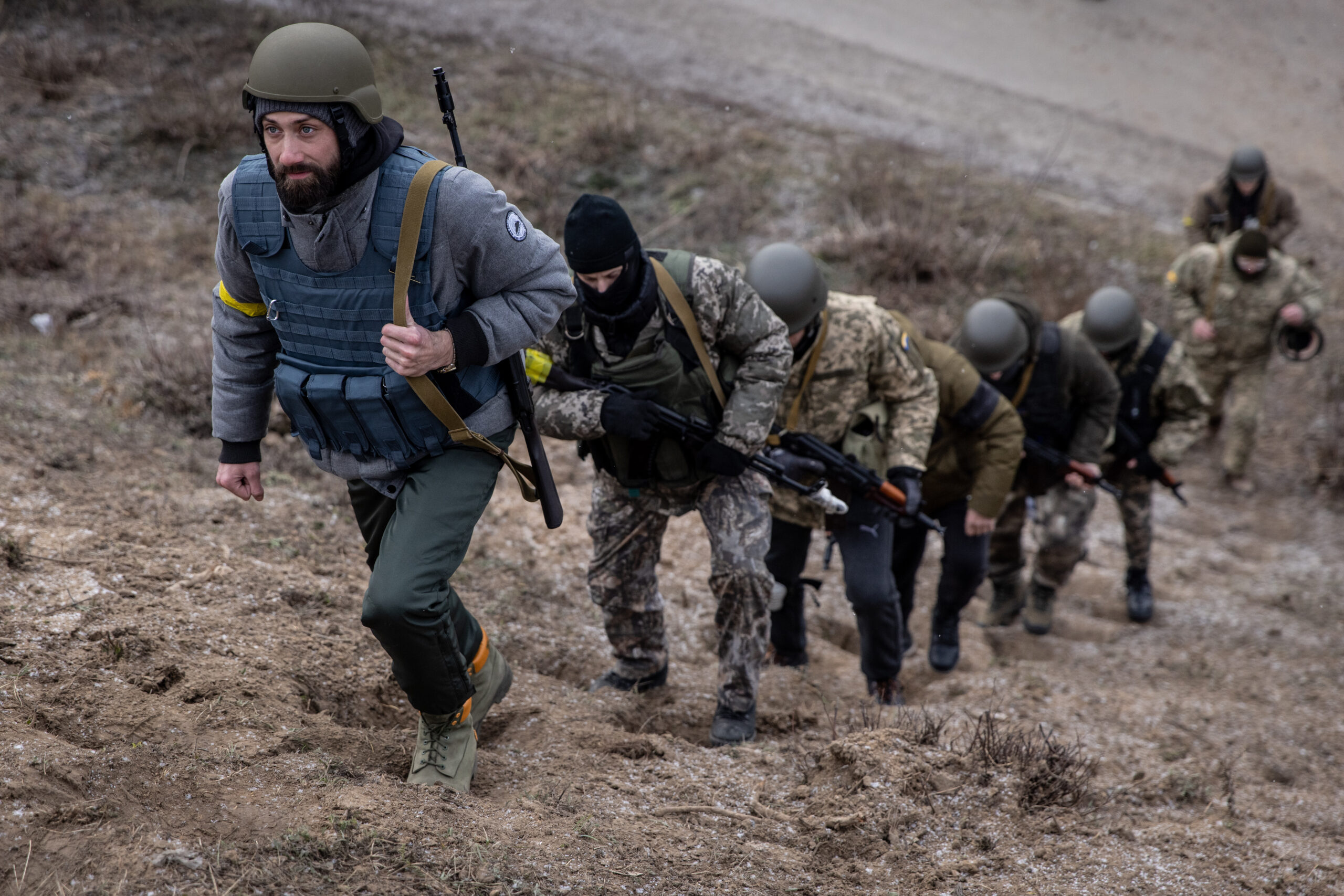
The cultural class is also reconsidering its early suspicions of President Volodymyr Zelenskyy. While overwhelmingly elected, the former sketch comic and TV entertainer was widely considered at best lightweight and at worst a puppet for shadowy Russian-aligned interests (“They’re all terrible,” a friend told me before the 2019 election that brought Zelenskyy to power, “at least he’s funny.”) Political preferences aside, his current (reported) 91% approval rating in crisis may remind Americans of a certain age of the similar rallying around George W. Bush in the immediate wake of 9/11 (or the maddeningly effective ease of an experienced entertainer like Ronald Reagan in extemporaneous speech to a camera.)
But the admiration is real: “Today I told my friends that I can’t imagine any other person that I [have] so dramatically changed my mind about,” says Brener. “I didn’t vote for him. I didn’t like his program; I didn’t like his statements. But he changed during these last five days. It’s an honor to have a president like that in such tough circumstances. I can’t say anything else about him.”
Dudko: I was never expecting to say something good about President Zelenskyy, but this situation changed that. He’s acting like a real leader now. I thought that [Zelenskyy] was more like a talking head in the TV [with] somebody who stands behind him—[someone] that was really making moves instead of him. Everybody I know had pretty much the same impression, even though the vast majority of people two years ago voted for him. It was probably the most democratic election that we ever had—73% [voted] for him, even though he didn’t have any political program. At first, everybody was charmed. But that charm was like the morning fog — it just disappeared. Now, everything’s changed. Really, I think the whole nation is supporting him.
Sidorenko: It’s pretty incredible. He wasn’t the most popular, and probably not the best president in general, but he is the perfect military leader for some reason. He is so inspiring, even for people who didn’t vote for him—like me! Ukrainian lore is getting richer and richer with new heroes every day. President Volodymyr Zelenskyy belongs in this pantheon.
Zoria: I absolutely did not vote for him. And I know very few who did in my circle, among the cultural class. But I would say that he has the admiration, the respect, of everyone now. People are made by the situations that they find themselves in, and he has definitely risen to the occasion. Today, I watched his address [to] the EU, and the entirety of the EU session was standing with applause. And I don’t think this is something anybody would have thought possible even a few months ago.
Kladbische: I am one of the people who really disliked Zelenskyy. But now I’m ready to apologize for all the funny memes that I posted to insult him. When we win, I will probably go to the square with a poster: “Zelenskyy, sorry for the offensive jokes on the Internet. You are my hero now.”
Boole: I am fucking shocked, to be honest. I was extremely not supporting him. Now I’ve changed my opinion. I already wrote on my social media that I’m sorry for all the bad things I said about this dude, from the bottom of my heart. I’m sorry for every fucking word. I made a mistake. I’m just surprised how this guy turned from a comedian and actor doing voice dubbing for Paddington the teddy bear—to one of the strongest leaders right now in modern history. That’s the guy telling the American president: “I don’t need a ride. I need a weapon.” What the fuck, man? His balls are really big!
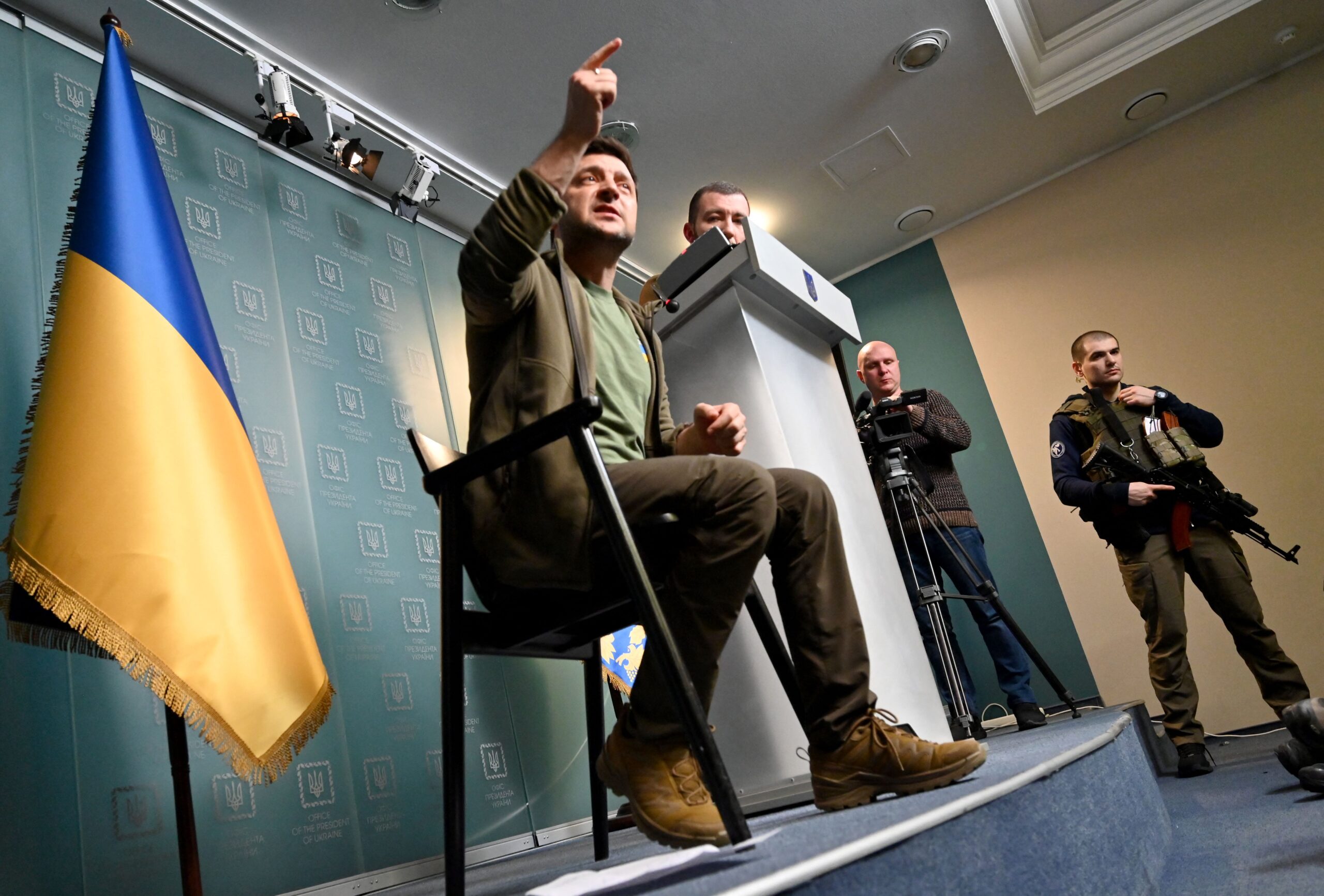
Most of the people I was able to contact (as of March 1, with “able to contact” the key phrase) were in relative, if profoundly anxious, safety: their internet, water, and heat still worked; stores remained stocked. At this point in Kyiv, Dudko says the situation is relatively stable: “Everything you want, you can get; the grocery stores, the big supermarkets, they are open. And there is no problem even if you want to pay with a bank card, you can still do that. This is also a good, a good sign—not cash only. Water is here. The main problem is bread, some long-term meat products—if you know what I mean—and milk, all the [dairy] products.” Kyiv has cut off alcohol sales. “This is the right move,” says Dudko. “I cannot imagine somebody wants to drink in this situation. You quit everything. The way you feel all these days is like, you’re constantly having an adrenaline [rush]—it’s like super-anxiety, but not [in an anxious way]. It’s like your body is always mobilized.”
But as Dudko and the country watched the footage of Kharkiv’s destruction, he knows how suddenly that stability can be dismantled. “My heart really, really hurts when I see those videos from Kharkiv,” says Dudko. “This is real pain. I love that city. Sorry for my speaking problems, but it’s an emotional thing. I know a lot of people there. I really love the city and I cannot watch that without any emotion.”
Brener lives closer to Kharkiv, in a village outside Poltava, and has been in constant contact with bandmates there: “It’s really hard to go to the street and buy [food] in Kharkiv right now,” he says. “First of all, you will have huge lines—you can wait literally two hours just to get inside the market. Second of all, you really can get killed each second. I have a friend [in Kharkiv], a drummer and sound guy. He had this minivan and yesterday, he volunteered to drive and support people with food—with bread, water, just basics. And his car got shot—he’s fine. But just imagine, your city is destroyed, and you get shot in your car when you’re just trying to support people with food.
Brener said that aside from checkpoints and curfews, the situation in his village is less severe. “Obviously people are scared because you literally can die. Today, for example, my friend went to buy bread in the center of Kharkiv, and near the market, there was [a] bombing. Some guy next to him got killed, and he just ran away to the subway station. It’s pure luck that he is still alive.”
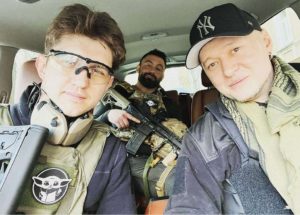
Evacuation is a more complicated choice than it may seem. The westbound route is already overwhelmed by displaced persons and is by no means guaranteed safety. “Five minutes ago we had this conversation,” says Brener. “There are some safe ways in Ukraine, some safe roads. But it’s really dangerous. We are discussing, do we want to travel by train, or do we want to stay here, or maybe travel by car?” Trains are still running to Lviv, “but if you’ve ever seen footage [of] refugees, or movies, it’s like that—you have a lot of people in railway stations and there are no tickets. So basically people trying to get into those overloaded trains.
A week after our initial conversation, Brener had already left his village on a refugee train headed to the border. “It was a hell of a road; like 100 people and dogs in a very old carriage that’s only supposed to carry 50 people,” Brener wrote. “I was standing in a crowd for about 24 straight hours, but in general, it’s not that bad compared to being under attack.”
A major factor for young men is martial law which forbids men aged 18 to 60 from leaving the country. Given that, Dudko says, he may as well stay and defend his home: “I’m here with my family. I have a lot of things to protect here. This is my home, Kyiv, the city that I was born in and live the whole life, my love, precious love; and I’m not about to leave it.”
A result of this law, though, is that families trying to protect their children face a wrenching choice: a mother and children crossing the border would have to leave their military-aged men behind. Lusya Zoria is a Kyiv-based drummer for several bands, who drove west with her family on the second day of the invasion:
We left very early at around 6:00 a.m., and we reached the city where we’re in around one around 1 a.m. So, 18 hours on the road and it was about 530 km. We were driving. So I’m with part of my family, part of my family is back home in Kiev. My in-laws, there are kind of in the suburbs and my father is with my grandmother. They made it to her village, which is kind of in the middle of Ukraine as well, so we’re all over.
It was many, many, many cars. People were super nervous. There was a big rush of people trying to leave the city on the very first day. In the night here, you’re just constantly waking up. So we woke up really early at around 5:30 a.m.—not because we could hear anything; we have really good windows in our apartment—but we have really thin walls, so we could hear our downstairs neighbors running around really hectically. So we took a look at the news and we realized that it had started, that they were launching rockets to the Kyiv outskirts targeting Kyiv International Boryspil Airport and other military bases on the other side of town.
We had our go bags more or less ready to go, and we had a plan that if things would start, we would first gather in one place, the whole family. So we grabbed our car, grabbed our dog, went to my mother’s, picked her up, got her things together. And then we went to my in-laws’ house where my brother-in-law and his wife and their nine-month-old baby; they all joined us. But it was very hard to leave the city even then. Everyone started moving, westwards towards Lviv and Polish border and the border with the EU. And we just realized that we wouldn’t be able to leave the city in the first twelve hours, so we decided to stay put. On the second day, fifteen minutes before the curfew, we were already on the road.
It was a long drive. Petrol—even on the very first day, there were super long lines. Again, because we were ready for quite a while, we had our car, gassed up and ready to go; but still, we were traveling very far, so we did need gas. People [were] super nervous; driving really fast. [They] already kind of knew as we woke up that morning—we woke up because we heard blasts again, and it was when they were, when the Russians, they started bombing the Left Bank. In the night here, you’re just constantly waking up. We left on Friday.
[Crossing the border] is still an option that we’re still considering. Lots of difficult decisions to make up every day, because my brother-in-law and their wife don’t want to split up, but men can’t leave the country unless they’re over 60. So I think this is what a lot of families are really facing right now is, what choice do they make? We left my parents-in-law—they didn’t want to leave, so they stayed back in the Kyiv outskirts. And now we’re here in an unfamiliar place. We were very lucky because we arrived early, and we were able to secure a spot for the night. Even though some of us have been sleeping on floors, at least we’re together.
But the border crossing’s already a huge issue. If you arrive by car, it’s a three-day wait to just pass the border, and lots of children and women are getting separated. There’s been a lot of things in the news about how African students and people that are not of Ukrainian nationality—they’re not being let through the Border. But the fact is that it’s just not many people are being let through the border, not everyone has their documents, even though the requirements have been very lenient. My husband’s colleague was trying to cross the border near L’viv, which is the busiest right now. She worked in Syria as part of an NGO. And she says that she saw things that she saw in Syria—people giving children across the fences.
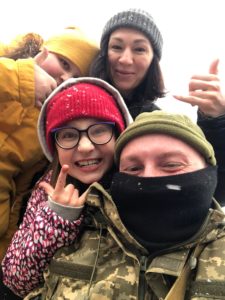
As Ukrainians on the ground defend their country and President Zelenskyy continues to demand more help from his western allies, Ukraine’s cultural and musical institutions are joining in through advocacy and aid.
The Atlas Club, which runs Ukraine’s biggest music festival, is using its space as a distribution center for humanitarian aid. The [Mystetskyi] Arsenal, one of Ukraine’s pre-eminent art institutions, has been coordinating exhibitions of Ukrainian art in foreign cities. An organizer of the Kyryliuk 41 dance club is in Berlin, organizing supplies to the front lines.
In Lviv, Lyana Mytsko has turned the Lviv Municipal Arts Center (of which she is the director) into an impromptu shelter, complete with a team of psychologists. Mytsko and her team arranged for ten cars to operate after curfew as a kind of taxi service for displaced persons arriving at the train station. “We have anarchism here—that’s our little joke about our DIY things,” Mytsko says. “We can [work] through the government, but the government is 90% shit. So all this work was mostly made by volunteers and people with contacts abroad.”
Advocacy has begun to reach out to the influential London-based NTS Radio, which has a large listenership in Russia, to convince them to include Ukraine-related programming to combat censorship and disinformation in Russia. “On one hand,” says Zoria, “the people that want to see the disinformation are getting it; but I still have a few friends [in Russia who] tell me that they send links through their Instagram and they’re just being deleted. They just don’t show up in their history anymore. So they know that all of these accounts [are] being monitored in one way or another.”
Few of the artists I interviewed expect help from Russians, who they perceive as cowed and timorous. “The minority of Russians who oppose Putin, who are on our side, are too afraid to stand up,” says Mahula, “‘cause they might be beaten by the cops,’ while people here live in bomb shelters for days.”
Sidorenko echoes this disdain: “Russians are just too passive. They can’t go in the streets to protest, it’s not in their blood. They’ve just been completely destroyed by the regime the last twenty years. Each time I see something like, ‘Hey, Russian people, you need to come out and protest,’ I just know it will not work. We’re just fucking different. Our local grandmothers [are] stopping Russian tanks with their bare hands; and people there in Moscow are afraid to come out on the streets because they might get thrown from work or something, and it’s just fucking ridiculous. I think they are all to blame for this, the whole fucking country—and Belarus. Because Belarus is silently joining this.”
How, then, can Americans—and American musicians specifically—act differently?
“Please,” says Mahula, “while Putin’s regime is alive—don’t play shows [in Russia]. A lot of our friends or relatives in Russia say, ‘We don’t support the war. We didn’t vote for Putin.’ But for the last eight years, they did nothing to change the situation or country they live in. Maybe if they don’t care that people are dying in Ukraine, they will care that they can’t go watch fucking Nick Cave.” (On March 3rd, Live Nation, the world’s largest concert promoter, announced it was ceasing operations in Russia.)
For the majority of American musicians who don’t have current tours booked in Russia or control over cultural institutions, the ask is twofold. First, spread the word and combat disinformation: “Unfortunately there are still a lot of Americans who believe the bullshit that American imperialism caused this war,” says Boole. “Take the dicks out of your ears. Russia is an aggressor and a threat. Period. [And] Belarus is their partner-in-crime.”
The second ask? Hard cash and arms—cash for arms.
“Economic sanctions work,” says Onopriienko, “But it takes time. What Ukraine needs right now is air defense systems. Russian forces aren’t scary at all, but the ballistic missiles sent to residential areas are. Ukraine desperately needs to cover its sky.”
“Ukraine is a living shield for the world,” adds Khomenko, “in front of the crazy dictator with one of the biggest armies in the world, who doesn’t care about human lives. We are fighting like hell, because we don’t want to be part of his sick empire. We will resist till the last drop of our blood. And a little support would be nice.”
Zoria says Americans and others need to understand the larger context. “This conflict has been building for decades. This war has been happening for eight years. This is one-sided. We are in no way an aggressive force. But people, I think, did not understand how much Ukraine actually is of consequence to Europe and to the wider world.”
“I understand,” says Brener, “People are peaceful, they don’t want to support troops. But at the same time, our troops are basically the only reason that I’m talking to you right now.” Military assistance doesn’t give simply battlefield benefits, Zoria points out:
I know that in the U.S., you have your own history with the military, how much money it receives from the government. And I know that people are very hesitant to give to military forces—and if you don’t support that, you don’t have to—but supporting the Ukrainian military is very important. The humanitarian consequences will be felt for years now. People can donate to other causes; there will be many, many times ahead when support will be needed for millions of refugees. Europe will be overwhelmed. The refugee crisis that existed before will be nothing compared to what is happening. And I think that it’s the responsibility also of Western forces of Europe, of Britain, of America to support [them], because I do feel that they owe Ukraine a great debt. Everyone was talking about—in the weeks leading up to this buildup, I saw many pieces talking about how you know, “Gosh, Germany will have to pay this much for oil now and for gas,” and nobody was talking about how food supplies will be affected, and the amount of humanitarian pressure of refugees that will be all over the world. I do think that everyone should be receiving everyone that they can at this point.
If the Ukrainian military receives the support we need, the faster we can beat [the Russians] back, and the faster we can return to our homes and begin to rebuild. Nobody wants to leave their homes. I know so many people talking about how all documents are being waived—just come [to] Germany; any point in Europe that you want. Ireland is opening up its borders. You can go anywhere—which is something that so many people have wanted for so long! But you cling to your house that is being bombed, because you want to stay home.
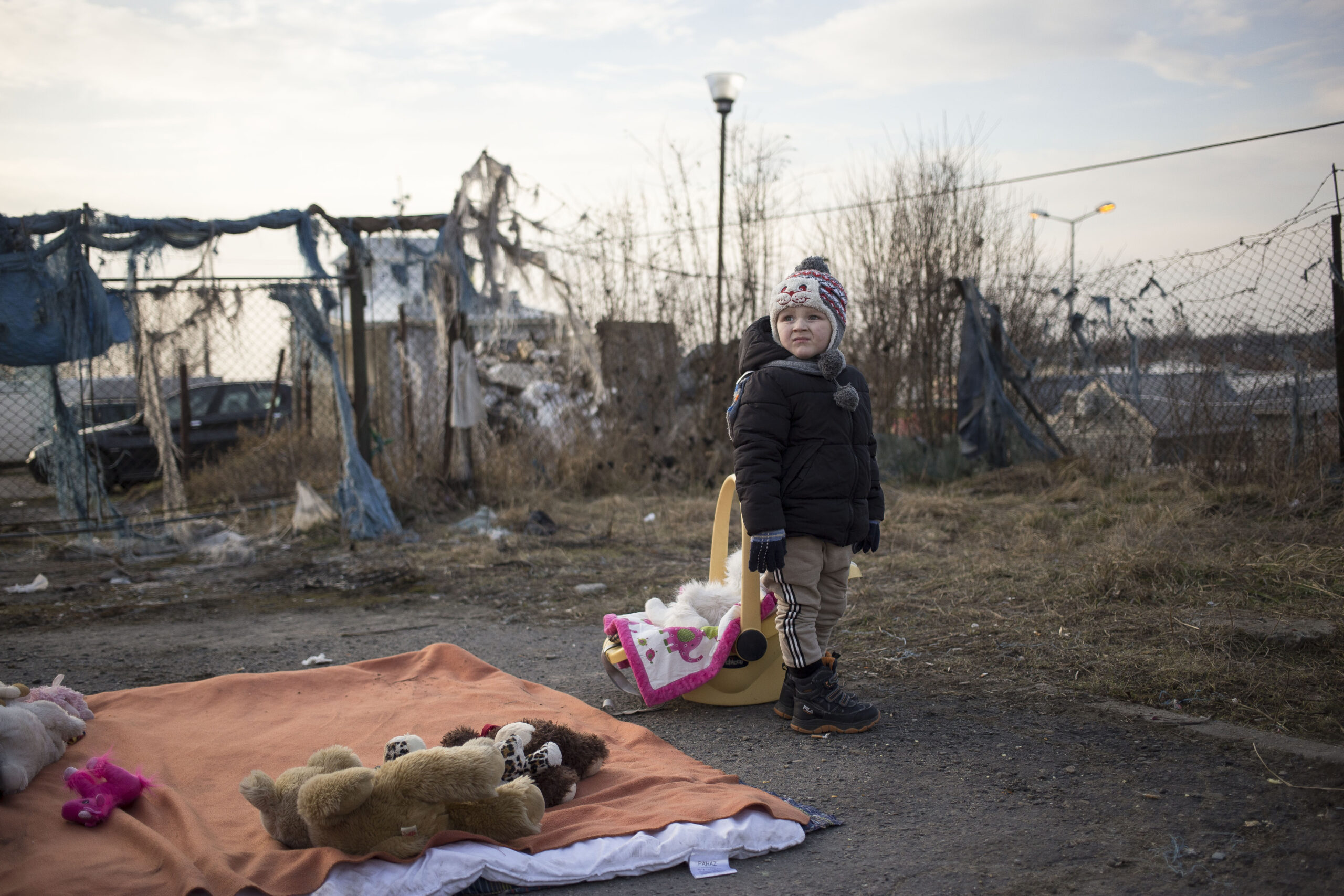
At the moment—despite the hundreds of thousands of displaced persons, despite the indiscriminate bombings and nuclear threats—optimism and morale are, at least in the early glow of a week of unexpectedly brawny Ukrainian resistance, high.
“We’re gonna hold on,” says Dudko. “Even in the unlikely event [that] Russia somehow will take over—we already won. We already won. They may still—I mean, I don’t want to believe in that, but they are more powerful in some regards; in terms of army, for sure. And also Belarus, our other neighbor from the north, are allies with Russia, so it’s more like two countries against one. So there are chances that they might take over and this might take some time. But even if they capture Ukraine, they will not be able to hold it. Everybody is against them.”
Perhaps the best riposte to Putin’s explicit belief that Ukraine “is not a real country” has been that resistance: a polity without a sense of nationhood would hardly have a sense of national identity to so vigorously rally behind.
In a taped, Ukrainian-language message, Gogol Bordello’s Eugene Hutz—probably the best-known Ukrainian-American musician—says that the “inadequate invaders … have not yet understood that the psychological resilience is a national Ukrainian trait that is forever on the Ukrainian hard drive, and because of this trait, there is a victory for all Ukraine.”
Yet everyone is sober about the fact that even the best-case scenario will leave a profound human cost.
Zoria urges the international cultural institutions making good-faith efforts to Ukrainian artists at risk to be mindful of the damaging tendency—sometimes intentional, sometimes not—to conflate Ukrainian culture with Russian culture. “There is a concern that Ukrainian voices are being pushed out,” Zoria says. “I see opportunities in my feed popping up for creatives, musicians, photographers or anything like that—residencies, job opportunities in the US—but now I see that they are open to both to Ukrainians and Russians.”
While she’s sympathetic to the vulnerability of Russian political dissidents, “it is my personal belief that these opportunities should be mainly for those who are forced out of their homes by war, and not by political means—at this stage.” The international cultural community, she says, could be more conscious of integrating Ukrainian voices as Ukrainian:
“The cultural sphere has always been dominated by Russia, by its overwhelming force, and amount of propaganda,” Zoria says. “There has been so much cultural appropriation [by Russia, of] Ukrainian culture, in general: [Kazimir] Malevich, who was born in Kyiv, who taught at the academy that I used to walk by every single day. My great-grandfather—he was a cello player. After the second world war, he started living in Russia. A couple of months ago, I saw that there were concerts in his name—and in his biographies, it’s completely ignored that he came from Ukraine. He’s a ‘Russian composer.’ He’s a ‘Russian musician.’ This is just one example of something we’ve seen for a very long time.”
Dudko believes that Ukrainian music and art will have a massive resurgence after the war. “It will bring us to a higher level. There will be so much to say, so much to show and to share, that it will last for ages,” Dudko says.
Music communities pride themselves on their interdependence, resilience, and self-reliance. But rarely are those skills and networks, honed on DIY shows and tour emergencies, put to this level of test. “All of my friends from the music scene are constantly texting each other,” says Brener: “‘How are you?’ ‘Are you OK?’ Basically, are you still alive?’”
The morning after I spoke to Lusya Zoria, she had left the country, splitting up her family: “Since we talked, I’m already in Romania with my mother, my sister-in-law and her nine-month-old, and a family friend who is behind the wheel. We had to leave my husband and brother-in-law behind in Ukraine. But on my way to a house to spend the night, which I found through my music friends in Berlin and Bucharest. In a matter of hours, I had options in four cities across Moldova and Romania.”
“The solidarity is amazing. The decisions are heartbreaking.”
Franz Nicolay is a member of The Hold Steady and the author of The Humorless Ladies of Border Control: Touring the Punk Underground from Belgrade to Ulaanbaatar and Someone Should Pay For Your Pain.
A Benefit for Ukraine featuring Gogol Bordello & Friends at City Winery in New York City on Thursday, March 10. The show will be available to watch via Livestream. Purchase tickets at www.citywinery.com.
Links to help Ukrainians:
Vetted charities helping Ukraine and Ukrainians
Come Back Alive (foundation providing support to Ukrainian Armed Forces)
Emergency Temporary Relocation Resources for artists and cultural workers
Resources for disabled and BIPOC Ukrainians

Leave a comment